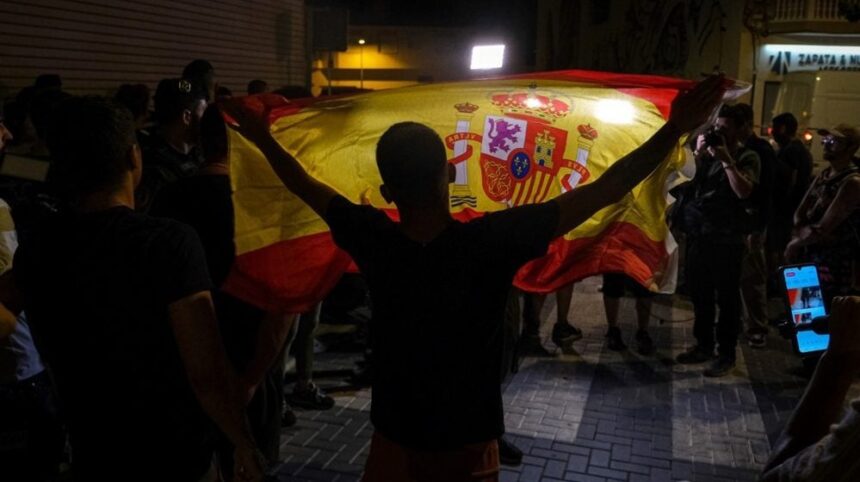Following an attack in Spain, right-wing extremists used social media to incite a full-blown manhunt for migrants, leading to several nights of unrest. The question arises: who is behind this call to violence, and is the social climate in traditionally liberal Spain undergoing a significant shift?
During a visit to Mauritania, Spanish Prime Minister Pedro Sánchez sought to portray his country as migrant-friendly. He emphasized Spain’s history as a country of emigration: “Today, much of our well-being and good economic situation we owe precisely to the people who come to us.” Until recently, the consensus that migration is an economic factor benefiting the country was shared not only by left-leaning coalition parties but, with certain reservations, also by the conservative opposition Popular Party. However, this consensus is beginning to erode.
Opposition Demands Harsher Measures
Five days after the racist riots in Torre Pacheco, opposition leader Alberto Núñez Feijóo of the Popular Party is demanding a firm and considerably harsher stance on migration. “For us, it’s clear – people come here to work and integrate into Spanish society. Whoever doesn’t adhere to that, we cannot accept them.” Feijóo stated that migrants who commit crimes must be immediately deported. Political analysts believe that with this pivot, the Popular Party is aligning closer with the far-right Vox party, which is the third strongest in the Spanish parliament and advocated for the deportation of millions of migrants even before the recent unrest.
Right-Wing Extremists Organize Manhunt
Mainly masked right-wing extremists marched through the streets of Torre Pacheco, a city of about 40,000 inhabitants, organizing targeted attacks on people they perceived to be of North African origin. This reportedly followed an incident where North African teenagers allegedly attacked a man in the city.
Spanish conservatives from the Popular Party are not going as far, but they are increasingly adopting the narratives of the extreme right, says Mikel Ramos, an expert on right-wing extremism. “Unlike other conservative or liberal parties in Europe, the Popular Party has never drawn a clear line and distanced itself from right-wing extremists.” Ramos states that the Popular Party is directly adopting Vox’s positions, which equate migration with crime and insecurity. “This is a problem because it increasingly distances itself from the political center, which it otherwise tries to represent.” According to the Spanish expert, this also contributes to shifting public discourse further to the right, a trend exacerbated by social media.
Aggressive Group Incites Violence, Spreading Propaganda Across Europe
The call for a manhunt against Maghreb migrants originated from a group named “Deport Them Now” (Deportujte ih sad), known on social media for its extremely aggressive tone. On Telegram, according to Ramos, the group has, among other things, called for “hanging the Spanish prime minister” or “using gas on Muslims.”
The group’s coordinator is believed to be a 29-year-old man from the Catalan city of Mataró. He has been seen at demonstrations organized by the far-right Vox party and reportedly recently participated in an international gathering of identitarian and right-wing groups in Milan. Police arrested him this Monday, and the prosecutor’s office is investigating whether it constitutes a hate crime.
The group’s membership is not fully known, but that is not the crucial point, says Ramos: “The ‘Deport Them Now’ group is a kind of European network.” It’s unclear how many members they have in each country; it could be just one or two, Ramos emphasizes: “They are not dangerous because there are many of them, but because their propaganda reaches many.”
This propaganda spreads at an incredible speed, and often no one intervenes against it. According to data from the Spanish Observatory for Racism and Xenophobia, platforms like Telegram, YouTube, or Instagram last month deleted only eight percent of 54,000 reported hate messages. And only two percent were removed within 24 hours of publication. In Torre Pacheco, it took less than a day from the call for violence to the outbreak of racist riots. The Spanish government has already invited operators of large platforms for discussions to ensure that hate speech is removed more quickly from social media in the future.







